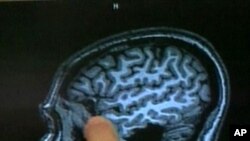Scientists are developing a test that could diagnose Alzheimer's disease in its earliest stages, a period when drugs can still help to improve the memories of those suffering from the fatal brain-wasting condition.
Today, there are no medical tests a doctor can use to positively determine whether a person has Alzheimer's. Experts say most physicians are not trained to diagnose the condition in an office visit, and screenings to assess memory and cognition are only about 90 percent accurate. The only way to confirm a diagnosis of Alzheimer's disease is through a brain autopsy after the patient's death.
Scientists have been trying to develop diagnostic medical tests. Researchers in Arizona used an experimental radioactive contrast agent, called florbetaben, during a positron emission tomography or PET scan. They found it lit up the telltale protein deposits, or plaques, that are characteristic of Alzheimer's disease.
While there are no drugs to cure Alzheimer's or slow its progression, early detection can sustain a patient's quality of life. Marwan Sabbagh, director of the Banner Sun Health Research Institute in Sun City, Arizona, and principal investigator in the florbetaben study, notes there are pills that can help to slightly improve a patient's memory.
"Even those modest benefits might allow someone to stay independent for longer or retain what they are able to do for longer than giving them no treatments," he says.
Florbetaben is just one of a number of new contrast agents that allows doctors to see Alzheimer's deadly amyloid plaques and to begin immediately treating the condition, Sabbagh says.
The research team studied 200 elderly participants who were nearing death, some with Alzheimer's disease and others without any symptoms of dementia. The participants underwent PET scans with florbetaben to look for amyloid plaques.
Researchers compared the brain scans of 31 patients, who later died, with the results of their brain autopsies. The imaging with florbetaben was almost 100 percent correct in identifying people with Alzheimer's whose autopsies also revealed evidence of the amyloid plaques.
This new diagnostic imaging, which could identify much younger Alzheimer's patients, comes at a time when new drug treatments for the brain disease are also becoming available.
"There is in development a whole generation of drugs, what we call disease-modifying drugs which are strictly intended to slow the rate of progression," Sabbagh says. "So, the timing of this is perfect."
News
Test Might Provide Early Alzheimer's Diagnosis

Currently, only way to diagnose brain-wasting disease is after patient's death





